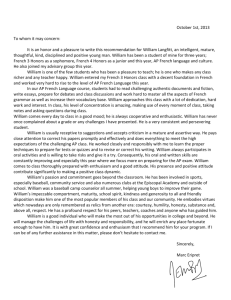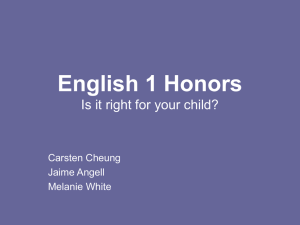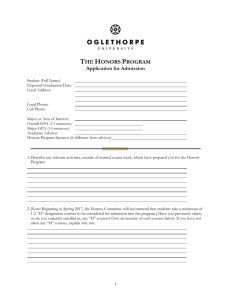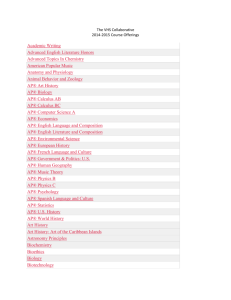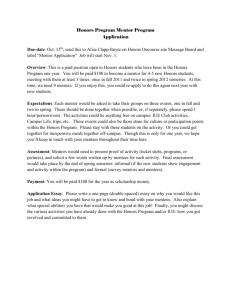2014-16 Honors College Fellows Application
advertisement
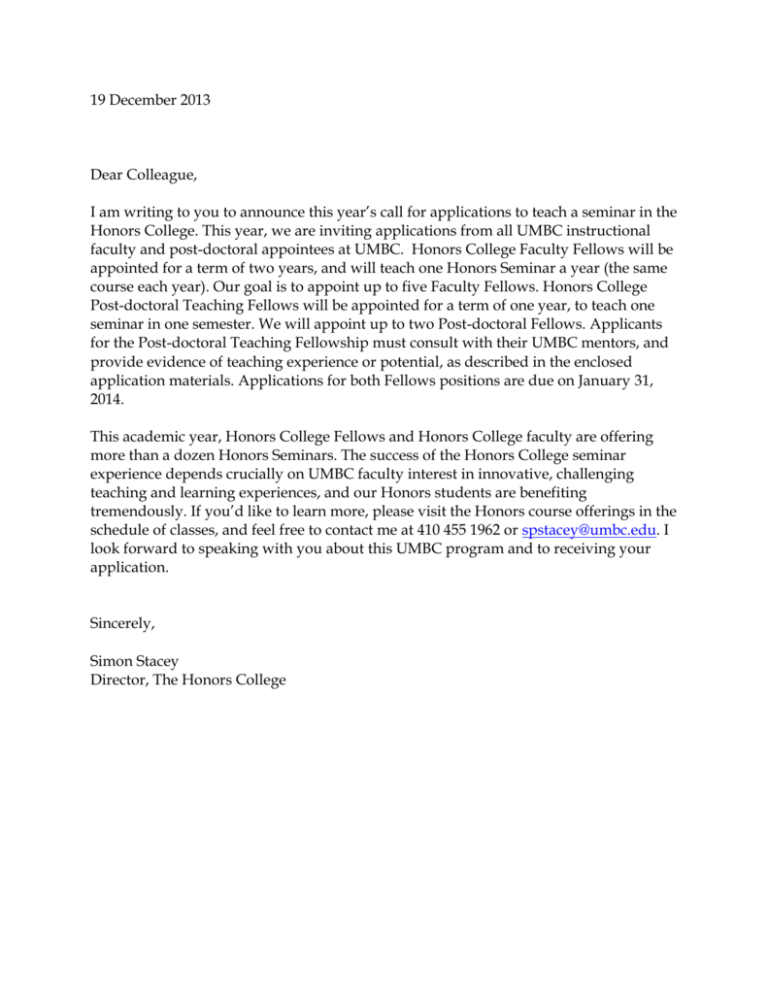
19 December 2013 Dear Colleague, I am writing to you to announce this year’s call for applications to teach a seminar in the Honors College. This year, we are inviting applications from all UMBC instructional faculty and post-doctoral appointees at UMBC. Honors College Faculty Fellows will be appointed for a term of two years, and will teach one Honors Seminar a year (the same course each year). Our goal is to appoint up to five Faculty Fellows. Honors College Post-doctoral Teaching Fellows will be appointed for a term of one year, to teach one seminar in one semester. We will appoint up to two Post-doctoral Fellows. Applicants for the Post-doctoral Teaching Fellowship must consult with their UMBC mentors, and provide evidence of teaching experience or potential, as described in the enclosed application materials. Applications for both Fellows positions are due on January 31, 2014. This academic year, Honors College Fellows and Honors College faculty are offering more than a dozen Honors Seminars. The success of the Honors College seminar experience depends crucially on UMBC faculty interest in innovative, challenging teaching and learning experiences, and our Honors students are benefiting tremendously. If you’d like to learn more, please visit the Honors course offerings in the schedule of classes, and feel free to contact me at 410 455 1962 or spstacey@umbc.edu. I look forward to speaking with you about this UMBC program and to receiving your application. Sincerely, Simon Stacey Director, The Honors College Honors College Call For Proposals: Honors College Faculty & Post-doctoral Fellows AY 2014-2016 The Honors College invites UMBC instructional faculty and post-doctoral appointees who wish to teach Honors seminars to apply to the Honors College Faculty Fellows or Postdoctoral Teaching Fellows program. Honors seminars provide faculty with the opportunity to teach courses linked to their research interests in classes limited to twenty-five students. When appointed by the Provost, Honors Faculty Fellows will teach one Honors seminar per year for the College for a term of two years, AY 2014-2016. Post-doctoral Teaching Fellows will teach only one Honors seminar for one semester in AY 2014-15. Applicants for the Post-doctoral Fellowships should hold a post-doctoral appointment at UMBC in any field. In addition to the application, post-doctoral applicants should submit evidence of teaching ability from UMBC or another institution and a letter of support from the applicant’s UMBC mentor stating that teaching for the Honors College is consistent with the candidate’s post-doctoral term and conditions of appointment. Evidence of teaching ability could include teaching evaluations or letters that testify to the applicant’s teaching experience or potential. The compensation for serving as an Honors College Faculty Fellow or Post-doctoral Teaching Fellow will be $5,000 per semester, remitted to the faculty member’s home department or directly to the Fellow. The Honors College intends to appoint up to five Faculty Fellows to teach in AY 2014-16 and up to two Postdoctoral Teaching Fellows for AY 2014-15. Honors Seminars Honors seminars are an essential part of a challenging undergraduate experience: students work closely with faculty in classes limited to twenty-five students, where they are introduced to the rewards of work in different fields. In turn, Honors seminars provide faculty with the chance to explore new topics and to experiment with innovative teaching methods in classes of students drawn from many disciplines. All Honors seminars emphasize the development of critical thinking skills and should be designed to encourage students from different majors to participate fully. Honors seminars are offered at the 200 and 300 levels. The 200-level seminars introduce students in their first years at UMBC to primary research material in the Fellow’s field. They are also often interdisciplinary. Honors 300-level seminars are often focused on a single discipline or a single problem studied from an interdisciplinary perspective; they also encourage mastery of research skills and longer writing assignments or projects. We are especially seeking faculty from all disciplines who will emphasize writing throughout the semester. The syllabi of previous seminars are available if desired. Application Process Inquiries regarding the Fellows program may be directed to the Acting Director of the Honors College, Simon Stacey, spstacey@umbc.edu or x51962. Applications are due by January 31, 2014 and will be reviewed by a committee from the Honors College and the Provost’s Office. Final appointment of the Honors College Fellows by the Provost will be made by February 28, 2014. The Honors College will then support the Fellows in any work needed, where appropriate, for cross-listing with home departments. Applications should be sent to: The Honors College, Attn: Faculty Fellows Program, Library 216L, UMBC Campus, or by e-mail to spstacey@umbc.edu. Characteristics of an Honors Course Adapted from the guidelines of the National Collegiate Honors Council Analysis and Exposition – The subject matter is not by itself the end but is also the means by which the faculties of analysis and exposition—the ability to think and reason, and the ability to express the results of that thinking and reasoning— are brought to the highest realization of the students’ potential. Collaborative Teaching and Learning – Honors course instructors, sensitive to the distinction between teaching and learning, employ a collaborative pedagogy rather than the “empty vessel” approach to the classroom. Smaller Classes – Honors courses are limited to no more than 25 students. Dialogue – The small size of Honors courses enables the instructors to encourage students to participate in the classroom conversation in virtually all class sessions. Writing – Based on the assumption that writing is learning, Honors courses require a considerably greater amount of written work than do most regular courses. Interdisciplinarity – Honors courses frequently move across disciplinary boundaries in order to make connections among the different methods of knowing characteristic of the several disciplines. Reflection – Honors courses ask students to reflect frequently on the relevance of the individual course to their educational and professional plans. APPLICATION FOR THE HONORS COLLEGE FACULTY FELLOWS PROGRAM For the Two-year Term 2014-2016 NAME:____________________________________________________ DATE:___________ DEPT.:______________________________________________________________________ POSITION:___________________________________________________________________ PROPOSED COURSE TITLE: ___________________________________________________ ____________________________________________________________________________ HONR 200-LEVEL SEMINAR ____ or HONR 300-LEVEL SEMINAR _____ SEMESTERS TO BE TAUGHT (1 per academic year): Fall 2014 and Fall 2015 or Spr 2015 and Spr 2016 On an attached sheet, please answer the following: 1. Have you taught an Honors course or section at UMBC before? If so, please give the title of the course and the year it was taught. 2. Please provide a brief description of the learning goals for your proposed seminar, including the materials and teaching strategies you will use to help students achieve those goals. As the attached document, “Characteristics of an Honors Course,” states, Honors courses should challenge students in many different ways. How will your seminar fulfill the definition of an Honors course? How will you incorporate challenging writing assignments into it, and encourage dialogue amongst students? 3. How do you plan to meet the demands of teaching a course with students from different majors? Are there particular texts, strategies, or teaching methods you plan to use to introduce them to your discipline? 4. What are the student learning goals for your course? How will you determine whether or not these goals are met? 5. Please attach a rough draft of your course syllabus (exact dates and pages of reading are not required) and a current CV. Before submitting an Honors College Faculty Fellow application, a faculty member must discuss the proposal with his or her department chair or program director and obtain a signature of support. This is to ensure that the faculty member and the chair have agreed on the teaching load expectations for the two-year term if the faculty member is awarded a Fellowship. The applicant and department chair or program director should sign this sheet only after that discussion has taken place. Faculty Applicant Signature: ____________________________________ Date:________ Department Chair or Program Director:____________________________ Date:________ APPLICATION FOR THE HONORS COLLEGE Post-Doctoral FELLOWS PROGRAM For the One-year Term 2014-2015 NAME:____________________________________________________ DATE:___________ DEPT.:______________________________________________________________________ POSITION:___________________________________________________________________ PROPOSED COURSE TITLE: ___________________________________________________ ____________________________________________________________________________ HONR 200-LEVEL SEMINAR ____ SEMESTER TO BE TAUGHT: or Fall 2014 HONR 300-LEVEL SEMINAR _____ or Spring 2015 On an attached sheet, please answer the following: 1. Have you taught an Honors course or section before at UMBC or elsewhere? If so, please give the title of the course and the year it was taught. 2. Please provide a brief description of the learning goals for your proposed seminar, including the materials and teaching strategies you will use to help students achieve those goals. As the attached document, “Characteristics of an Honors Course,” states, Honors courses should challenge students in many different ways. How will your seminar fulfill the definition of an Honors course? How will you incorporate challenging writing assignments into it and encourage dialogue amongst students? 3. How do you plan to meet the demands of teaching a course with students from different majors? Are there particular texts, strategies, or teaching methods you plan to use to introduce them to your discipline? 4. What are the student learning goals for your course? How will you determine whether or not these goals are met? 5. Please attach a rough draft of your course syllabus (exact dates and pages of reading are not required). 6. Please provide a current CV and evidence of teaching ability or potential, as documented by items such as teaching evaluations or a letter testifying to your ability or potential from a faculty mentor or mentors familiar with your work. Before submitting an Honors College Post-doctoral Teaching Fellow application, the post-doctoral appointee must discuss this application with his or UMBC faculty mentor and obtain a signature of support. This is to ensure that the post-doctoral appointee and the mentor have discussed the workload distribution for the coming year if the applicant wins a Fellowship. In addition, the letter of support from the faculty mentor should state that the Fellowship is consistent with the term and conditions of appointment for the applicant. The applicant and faculty mentor should sign this sheet only after that discussion has taken place. Post-doctoral Applicant Signature: _____________________________ Date:____________ Faculty Mentor Signature:_____________________________________ Date:____________


